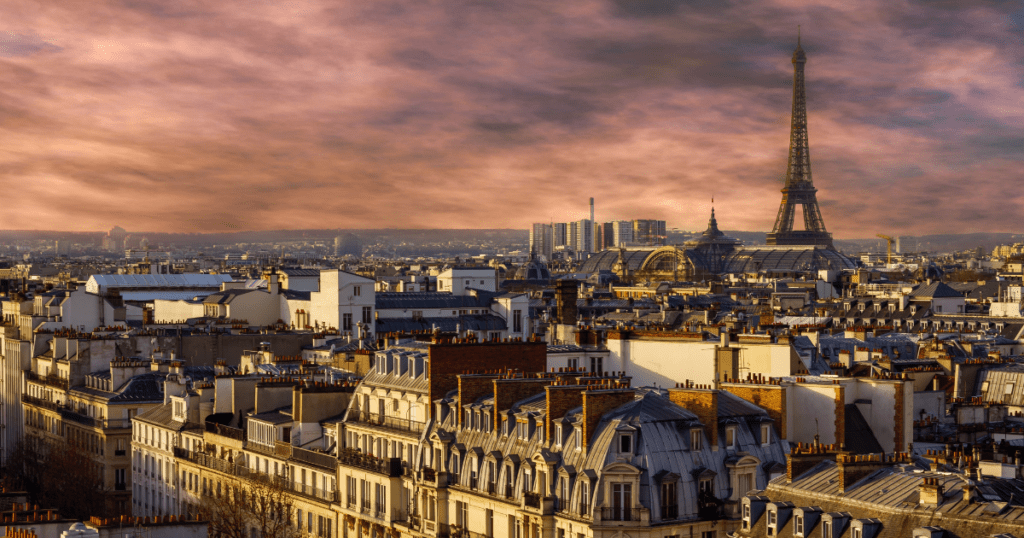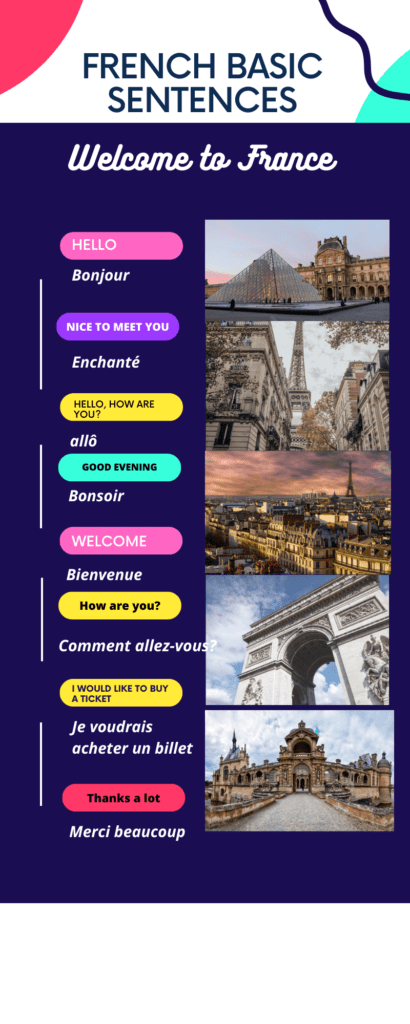Learning how to say Nice to meet you in French becomes your passport to building real relationships and enjoying the sense of camaraderie that characterizes the French way of life, as you prepare to immerse yourself in the beauty and culture of this fascinating nation, France.
Your excitement is probably fuelled by a desire to immerse yourself in the charm of France’s rich culture, enchanting scenery and people as per the magnetism of France and you are on the verge of an amazing journey.

A trip to France is more than just a change of scenery; It is an opportunity to explore the senses and experience the culture, language and customs that have defined this country.
We’ll explore the nuances of saying Nice to meet you in French in this article specially designed for your upcoming trip to France. Each phrase we examine provides a window into the social fabric of a nation, where the words used to express politeness not only indicate the degree of familiarity, respect, and warmth between people.
The French language offers a variety of words that brilliantly capture the essence of these occasions, from informal conversation in local markets to formal conversation in business contexts.
So let’s equip you with the language skills that will make your encounters even more memorable as you get ready to eat croissants, admire famous buildings and soak in the joie de vivre that sets France apart.
If you understand the nuances of these receptions, you’ll be able to confidently negotiate a variety of social situations, embrace cultural nuances, and build friendships that will last long after your trip is over. Come on to this language adventure where the art of saying nice to meet you in French becomes an important component of your trip to the charming country of France.
 Basic Greeting: “Enchanté(e)” – The Spark of French Encounters
Basic Greeting: “Enchanté(e)” – The Spark of French Encounters
- “Enchante(e)” refers to the wonder of meeting a new person. Literally, it translates to “enchanted” or “delighted”. When you use the word “enchante(e),” you are expressing both your pleasure at meeting the other person and your eagerness to communicate with them.
- Imagine you’re in a busy street market in Paris, chatting with a local craftsman or smiling at a fellow visitor.
- When you shake someone’s hand and use the phrase “enchante(e)”, you’re not just exchanging pleasantries; Rather, you are starting a conversation that transcends cultural and linguistic boundaries.
- “Enchante(e)” is adaptable to many types of conversation because it can be employed in both formal and informal contexts.
- When meeting someone for the first time, whether it’s a neighbourhood shopkeeper, another traveller, or even a business partner, “Enchante(e)” bridges the gap and fosters an immediate feeling of friendship.
Formal Politeness: “Ravi(e) de vous rencontrer”
- There will be situations that require a little formality and refinement, even though other exchanges may turn to casual familiarity.
- The expression “ravi(e) de vous rencontrere” served in these situations as a symbol of refined decency and respectability.
- This expression, which translates to “Pleased to meet you”, expresses the sophistication inherent in French society.
- Imagine entering a medieval castle or attending a gathering where introductions are treated with respect. When you extend your hand in welcome and say, “Ravi(e) de vous rencontrere,” you are expressing your pleasure at meeting the other person and your gratitude for the shared experience.
- “Ravi(e) de vous rencontrere” is your ticket to gracefully transcending formal situations.
- This statement shows respect and professionalism, whether you are attending a business meeting, speaking with local leaders, or participating in a cultural exchange. It shows that you respect the relationship and are open to meaningful conversation.
Informal Friendliness: “Content(e) de te rencontrer”
- In France’s picturesque streets, vibrant markets and charming cafes, you’ll experience spontaneous moments of companionship that demand an equally warm welcome.
- The phrase “cont(e)de te rencontrere” shines as an epitome of casual friendship thanks to these wonderful meetings, which allow you to establish a connection with a hint of familiarity.
- This phrase, which can be translated as “Pleased to meet you”, reflects the true satisfaction of making new friends.
- Imagine meeting a local craftsman while walking through a charming neighborhood, or meeting other people who share your interests while attending a cultural event.
- This greeting exemplifies the politeness of French hospitality. It is a request for exchange of experiences, jokes and stories.
- Imagine yourself enjoying a cup of coffee in a unique cafe while having a lively conversation with new acquaintances.
- In addition to extending a hand and saying “content(e) de te rencontrere,” you are also building a bridge of friendship and asking people to walk with you on your journey.
Variations for Different Situations: A Palette of Greetings for Your French Adventure
“Heureux/heureuse de faire votre connissance” – this phrase, which translates as “delight in making one’s acquaintance”, conveys a sense of formality that is traditional in nature. Imagine you are at a business meeting or networking event. When you offer a quiet hand and say these words, you are expressing respect and readiness for deeper relationships. This phrase is a great choice when a touch of sophistication is needed.
“C’est un plaisir de vous rencontrer” or “Pleased to meet you,” strikes a balance between formality and friendliness. Imagine interacting with the local people at festivals or cultural activities. You acknowledge the pleasure of the experience while maintaining a polite tone of smile while you say it. This adaptive reception works well in a variety of social contexts.
By adopting these different receptions, you can study the linguistic nuances of French while at the same time immersing yourself in the country’s rich cultural heritage.
So, as you drive through the charming streets and enjoy the wide variety of experiences that France has to offer, your welcome reflects your receptivity to the wonder of interpersonal interactions.
Beyond Words: Expressing Warmth
Words are just one thread in the communication tapestry that is human relationships. When you visit the French countryside, you’ll find that the real connection often goes beyond linguistic phrases.
The French are experts at using non-verbal indicators, impeccably combining their words with gestures and body language to convey emotion as well as feelings that are felt and heard.
Your universal language is a genuine smile; It is a powerful tool for expressing friendliness, frankness and companionship.
The warmth of a smile instantly transcends cultural barriers, creating relationships that don’t require language, whether you’re enjoying a cup of coffee in a quaint café or exploring the hidden gems of a picturesque town.
So, as you travel through the beautiful landscapes of France, extend your welcome with more than just a few words; Make them a symphony of movements and expressions that reflect the warmth and joy of your experiences.
By doing so, you actively engage in the dance of human interaction that makes travel so wonderfully fulfilling, rather than simply observing the culture.
MUST READ: The 10 Most Stunning Lakes in France: The Lake Escapes
Conclusion
You’ll find that the true meaning of travel lies not only in the destinations you visit but also in the acquaintances and relationships you make during your travels through France.
The art of welcoming others in French is your key to accessing these intimate exchanges and tapping into the spirit of this fascinating nation.
May the people you meet along the way be as captivating as the scenery, and the friendships you make last as long as the memories you make.
To successfully navigate the heart of France—a country where every “nice to meet you in french” is an invitation to embark on a shared adventure—you’ll need to harness the power of the welcome in all its verbal and non-verbal splendour.
Bon voyage voyageur!!!

 Basic Greeting: “Enchanté(e)” – The Spark of French Encounters
Basic Greeting: “Enchanté(e)” – The Spark of French Encounters